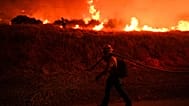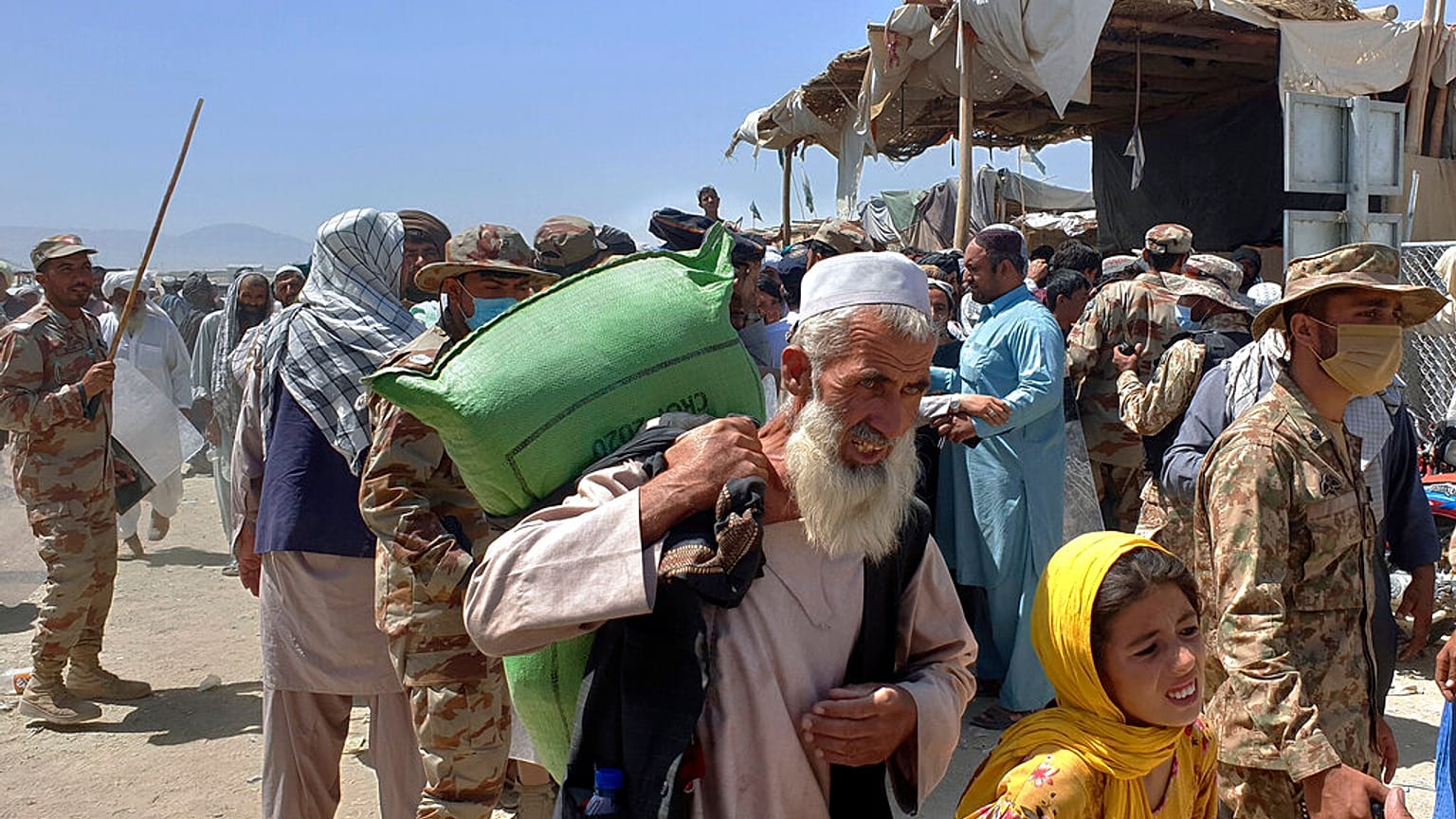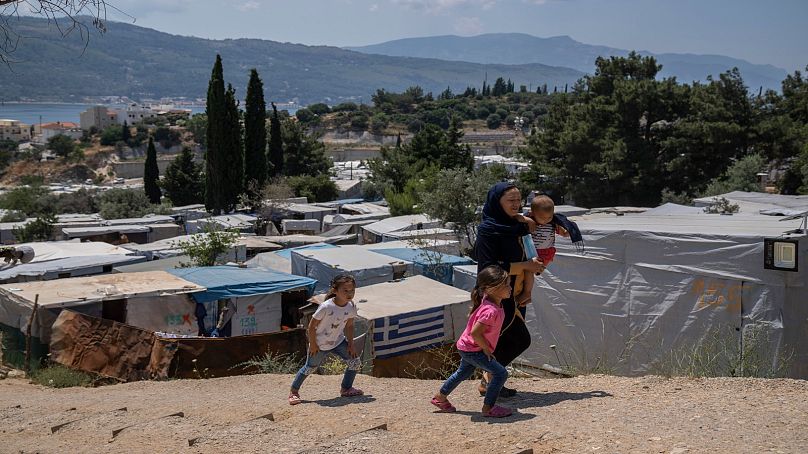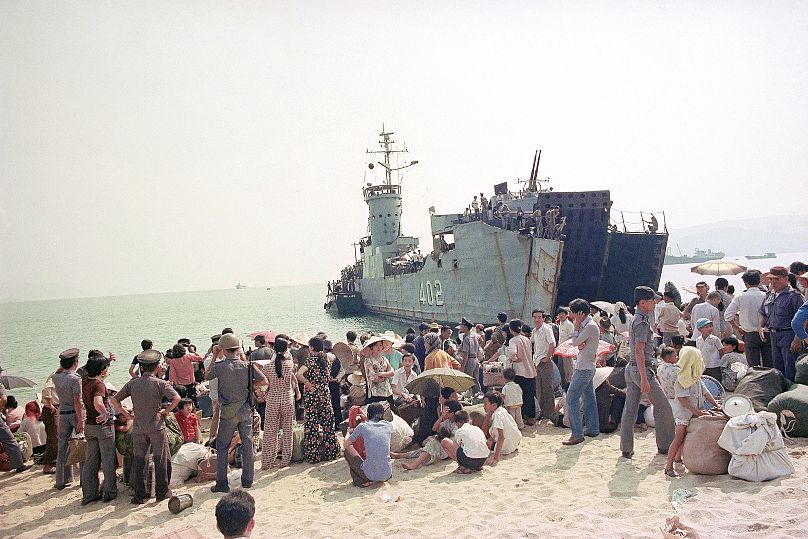The question comes as the Taliban completed a rapid takeover of the country.
When foreign policy expert Kemal Kirişci warned of "a mass exodus of refugees fleeing Afghanistan could spark another migration crisis" in April, his research received little attention.
 ADVERTISEMENT
ADVERTISEMENT
 ADVERTISEMENT
ADVERTISEMENT
Now, as the Taliban completes a rapid takeover of the country following the US and NATO decision to withdraw, his predictions may have already started to materialise.
An estimated 400,000 people in the country have been forced to flee their homes since the beginning of the year, according to the United Nations' refugee agency (UNHCR).
Relief organisations have raised the alarm on what could only be the beginning of a much bigger humanitarian crisis with devastating consequences for Afghans.
Caroline Van Buren, UNHCR's representative in Afghanistan, said between 20,000 and 30,000 people were leaving the country on a weekly basis.
"We are now seeing a large number of people leaving Afghanistan: flights are full and these people, of course, are people who have travel documents, we are able to get visas, who have residency permits in other countries," she said. "But now we're also seeing a trend of people who are moving in an irregular way, people who are fleeing for their own safety without travel documents and they are much at risk for exploitation."
With more Afghans seeking shelter or looking to escape, there are concerns in Europe that migrant numbers will increase.
The European Union is still scarred by the migration crisis of 2015-16, which saw hundreds of thousands of arrivals from Syria. The episode sparked intense disputes within the 27-nation bloc on sharing the migrant burden among themselves, with populist parties in some parts of Europe surfing on anti-immigration sentiment.
Chancellor Angela Merkel, who massively welcomed Syrian refugees in Germany in 2015 under her famous motto “We can do it”, has changed tune.
She addressed the issue of Afghan refugees at a press conference last month saying: “We cannot solve all of these problems by taking everyone in.”
“It cannot be the case that Austria and Germany are solving the Afghanistan problem for the EU,” Austrian Interior Minister Nehammer told reporters as he complained of a surge in irregular migration this year.
Turkish authorities said last month they were closely monitoring any influx of Afghan migrants, with more than 27,000 caught crossing the Iranian border so far this year. The Iranian-Turkish border has long been a popular smuggling route for Afghan migrants seeking to enter Turkey before continuing their journey to Europe.
In addition to the Turkey route, Lithuania says Afghan refugees have begun arriving into the country via Belarus, suggesting a new route could be in its infancy. Vilnius has accused Minsk of organising illicit border crossings as part of a "hybrid war" against the EU.
But while all the ingredients for a major refugee crisis are there, experts told Euronews that Europe's focus on trying to deter a hypothetical wave of Afghan migrants was misplaced.
Is Europe already seeing an influx of Afghan migrants?
Numbers show there hasn't been a massive influx of Afghan migrants in Europe over the past months thus far.
In the first half of 2021, around 3,200 irregular border crossings by Afghan nationals were reported at the EU external borders, a European Commission spokesperson told Euronews in a written statement.
"This number represents a 41% decrease compared with the previous year," the Commission added, noting that "border and travel restrictions linked to the coronavirus pandemic had an impact on last year’s figures."
While it's "very likely" that a large number of Afghans will need refugee protection in the coming months, "this massive crisis doesn't mean people reach Europe," said Gerald Knaus, the founding chairman of the European Stability Initiative (ESI), a think tank.
"To reach Europe, you need to cross a lot of borders which are very much harder to cross today than they were a few years ago," the migration expert went on, pointing to the alleged Greek policies of pushback at its land and sea borders -- which Athens denies.
In recent years, the EU has invested significant resources to strengthen its external borders and deter migrants. In 2016, the bloc agreed to pay Turkey €6 billion to prevent Syrian asylum seekers from crossing to Greece.
"When it comes to the facts, we don't yet see a large number of Afghans arriving in Turkey and certainly not in Europe. And it's not clear how many will be able to leave Afghanistan -- Pakistan claims that it can protect the border," Knaus noted.
"In 2015, in six months more than 500,000 people came spontaneously from Turkey to Greece. In comparison, now in the last six months, the total number of people reaching from Turkey to Greece, not just Afghans but everybody, was about 4,000. So that is 125 times less," he insisted.
When it comes to the Belarus route, the numbers are even lower. "It's been around 3,000 so far, so less than the 4,000 to reach Greece," Knaus said. Out of these 3,000, the majority were Iraqis.
"So you have a hysteria about big numbers and the reality, is very few people cross borders."
"This is fear-mongering and populism. If we confront this and say, 'No, the real crisis is a different one.' It's that at our borders, we're breaking EU laws, and in Afghanistan, a lot of people are in need of protection. These are people that we fought with and for, to rebuild the country for 20 years, and we've abandoned them," Knaus said.
Kirişci, who is a non-resident senior fellow at Brookings think-tank, that large numbers of Afghans "kept streaming into Turkey through Iran," citing UNHCR figures.
But both experts agreed on one thing: it will be extremely difficult for Afghan migrants to enter the EU.
"There is going to be a massive humanitarian crisis on the [Greece-Turkey] border, the kind of crisis that is going to damage the reputation of the European Union internationally as the world is going to see how the European Union resists refugees from entering the Schengen area," Kirişci told Euronews.
How has Europe responded so far?
The US announced last week that it was expanding its refugee programme for at-risk Afghans. Those eligible will now include current and former employees of the US government and NATO, US-based news organisations, aid agencies and other relief groups that receive US funding.
Knaus said Europeans ought to think about a similar programme, "giving at least the option to have access to Europe to those who have put their trust in working with our institutions in the last 20 years and who might be at real risk".
Denmark later became the first EU country to offer Afghans it had employed in the country a residency permit.
There is also the issue of Afghans already in Europe who have had their asylum applications rejected and face deportation.
Last week, France, Germany and the Netherlands announced it was joining European countries that had decided to suspend the deportations while the security situation in Afghanistan deteriorated.
Earlier, the European Court of Human Rights (ECHR) asked Austria to postpone the deportation of an Afghan man.
What are the options to tackle the crisis?
"There are a lot of people who might be at serious risk of persecution in Afghanistan who will not find protection unless Western policy finds a way for them to leave regularly," Knaus told Euronews.
Both Kirişci and Knaus told Euronews that the EU and other Western nations should respond to the crisis with a sweeping resettlement programme, on the scale of what was done with the Vietnamese boat people back in the late 1970s and 1980s.
"In the crisis of the boat people from Vietnam after 1979, there was a coalition of countries that had fought in Vietnam, or that was shocked by the humanitarian catastrophe of people leaving in boats to Malaysia, Indonesia, Thailand and Philippines and that said: we will bring people to our countries through resettlement in an orderly way."
The US programme announced last week does not go as far, since applicants must leave Afghanistan without any support to begin the adjudication process that may take 12-14 months in a third country.
The European Commission told Euronews that it "strongly" supported resettlement, including "through the provision of EU funds."
"Since 2015, EU resettlement programmes have provided protection to the most vulnerable refugees (more than 81,000 resettlements so far)."
Last month, the bloc launched an EU resettlement forum to mobilise funding for the resettlement of 30,000 refugees until the end of 2022.
But as the European Commission notes, "resettlement is a voluntary effort for the Member States; the decision to engage in resettlement and individual admission decisions lie with the Member States."
"I think it would be wrong to make this a European issue in the sense that it's the 27. They will not agree on anything, that's clear because governments don't. But the question is really for France, Germany, Spain and Italy and individual countries that fought in Afghanistan," Knaus said.
What does this mean for EU-Turkey relations?
As Europe is concerned over a new refugee crisis from Afghanistan, its thorny partnership with Ankara over migration issues is likely to come under the spotlight again. Often when the EU has a falling out with Ankara, President Recep Tayyip Erdogan threatens to stop preventing refugees from heading to Europe.
On Sunday, Erdogan said Turkey would work with Pakistan to stabilise the situation in Afghanistan and prevent an influx of migrants.
Kirişci predicted that as Greek security forces will try to stop Afghan migrants from entering from Turkey, there might be a major "humanitarian and possibly political crisis between Turkey and Greece."
According to him, Erdogan might try to use the crisis for "domestic purposes to show how the glorious European Union doesn't live up to its own standards and how Turkey receives vulnerable people, especially from Muslim states, with open arms."
However, he noted, "one of the consequences of these Afghan refugees arriving in Turkey is that it has revealed the growing public resentment of refugees at large in Turkey."
"The fact that the Turkish economy is going from bad to worse is exacerbating these feelings in the public opinion," he added.
It is not clear if Erdogan will try to "bargain" with the EU as his government did in 2015-16 when it negotiated its €6 billion migration package, the expert added.
But the EU seems prepared to keep the cash flowing. "The EU will continue to support its partners protecting refugees and people in need of international protection and supporting host countries," the European Commission spokesperson said.
Every weekday, Uncovering Europe brings you a European story that goes beyond the headlines. Download the Euronews app to get a daily alert for this and other breaking news notifications. It's available on Apple and Android devices.
















